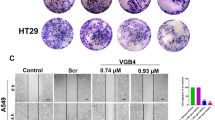Summary
To investigate the effect of meloxicam, a selected NSAIDs, on cell growth, expression of VEGF and angiopointin-2 (Ang-2) protein in HT-29 cell line, cultured HT-29 cells were treated with meloxicam of various concentrations for various lengths of time. The proliferation of HT-29 was detected by cell counting kit-8 (CCK-8), the cell cycle was determined by flow cytometer and the levels of VEGF and Ang-2 protein in supernatants were examined by enzyme linked immunosorbent assay (ELISA). The mRNA expressions of VEGF and Ang-2 in cultured HT-29 were determined by real-time quantitative reverse-transcription polymerase chain reaction. Our results showed that treatment of meloxicam of different concentrations and for various lengths of time had a cytotoxicic effect on the cell proliferation of HT-29 cells in a concentration-dependant and time-dependant manner. Cell cycle analysis showed that the cells were mainly blocked in G0/G1 phase. The VEGF and Ang-2 protein levels in supernatants of the culture medium were decreased gradually in a concentration-dependent or time-dependent fashion. The mRNA expression of cox-2, VEGF and Ang-2 showed a gradual and concentration-dependent reduction. It is concluded that meloxicam can reduce the expression of VEGF and Ang-2 at the protein and mRNA level in colon carcinoma cell line.
Similar content being viewed by others
References
McColl B K, Baldwin M E, Roufail S et al. Plasmin activates the lymphangiogenic growth factors VEGF-C and VEGF-D. J Exp Med, 2003,198:863–868
Poltorak Z, Cohen T, Sivan R et al. VEGF145, a secreted vascular endothelial growth factor isoform that binds to extracellular matrix. J Biol Chem, 1997,272:7151–7158
Saito M, Hamasaki M, Shibuya M. Induction of tube formation by angiopoietin-1 in endothelial cell/fibroblast co-culture is dependent on endogenous VEGF. Cancer Sci 2003, 94990: 782–790
Thurston G, Suri C, Smith K et al. Leakage-resistant blood vessels in mice transgenically overexpressing angiopoietin-1. Science, 1999,286:2511–2514
Thruston G, Rudge J S, Ioffe E et al. Angiopoietin-1 protects the adult vasculature against plasma leakage. Nat Med, 2000,6:460–463
Ahmad S A, Liu W, Jung Y D et al. Differential expression of angiopoietin-1 and angiopoietin-2 in colon carcinoma. A possible mechanism for the initiation of angiogenesis. Cancer, 2001; 92:1138–1143
Holash J, Maisonpierre P C, Compton D et al. Vessel cooption, regression, and growth in tumors mediated by angiopoietins and VEGF. Science, 1999,284:1994–1998
Holash J, Wiegand S J, Yancopoulos G D. New model of tumor angiogensis: dynamic balance between vessel regression and growth mediated by angiopoietins and VEGF. Oncogene,1999,18:5356–5362
Lobov I B, Brooks P C, Lang R A. Angiopoietin-2 displays VEGF-dependent modulation of capillary structure and endothelial cell survival in vivo. Proc Natl Acad Sci USA, 2002, 99:11 205–11210
Smith T J. Cyclooxygenase as the principal targets for the actions of NASAIDs. Rheum Dis Clin Nor Am, 1998,24:501–523
Sinicrope F A, Gill S. Role of cyclooxygenase-2 in colorectal cancer.Cancer Metastasis Rev, 2004,23:63–75
Oshima M, Dinchuk J E, Karman S L et al. Suppression of intestinal polyposis in Apc delta 716 knockout mice by inhibition of cyclooxygenase-2 (COX-2). Cell, 1996,87:803–809
Seno H, Oshima M, Ishikawa T O et al. Cyclooxygenase-2 and prostaglandin E(2) receptor EP(2)-dependent angiogenesis in Apc (Delta716) mouse intestinal polyps. Cancer Res, 2002,62:506–511
Tomozawa S, Tsuno N H, Sunami E et al. Cyclooxygenase-2 overexpression correlates with tumor recurrence, especially haematogenous metastasis, of colorectal cancer. Br J Cancer, 2000,83:324–328
Williams C S, Tsujii M, Reese J et al. Host cyclooxygenase-2 modulates carcinoma growth. J Clin Invest, 2000,105:1589–1594
Dempke W, Rie C, Grothey A et al. Cyclooxygenase-2: a novel target for cancer chemotherapy? J Cancer Res Clin Oncol, 2001,127:411–417
Author information
Authors and Affiliations
Additional information
ZHANG Ning, female, born in 1979, Doctorial Candidate
This project was supported by a grant from R&D program of Hubei Provincial government (No. 2005AA304B09).
Rights and permissions
About this article
Cite this article
Zhang, N., Tao, K. & Huang, T. Effects of meloxicam on vascular endothelial growth factor and angiopoietin-2 expression in colon carcinoma cell line HT-29. J. Huazhong Univ. Sc. Technol. 27, 399–402 (2007). https://doi.org/10.1007/s11596-007-0412-7
Received:
Issue Date:
DOI: https://doi.org/10.1007/s11596-007-0412-7




